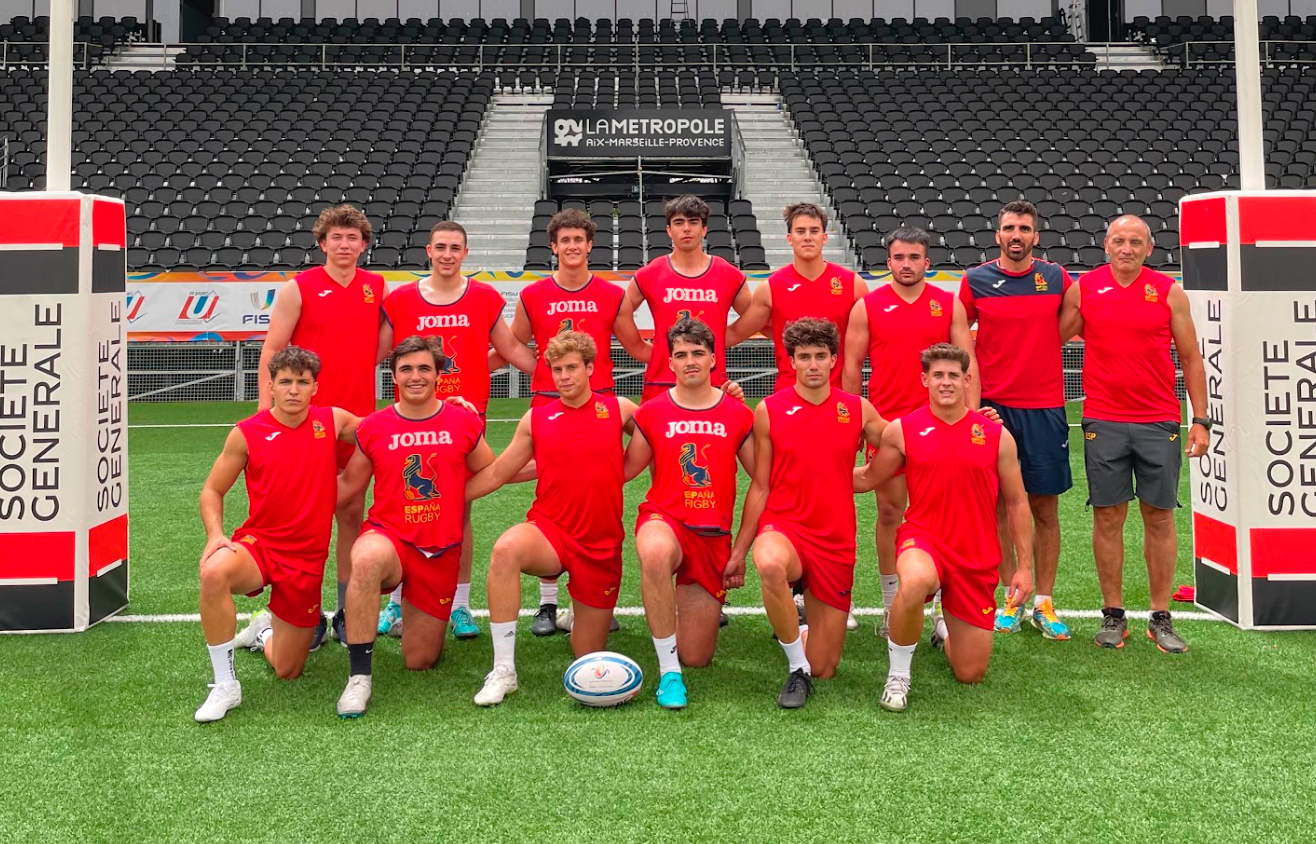
In addition, two other UV students from the men’s team came 7th in the same championship.
The World University Rugby Sevens Championship, held in Marseille this week, saw considerable success for Spanish athletes. The Spanish women’s team won the bronze medal and the men’s team placed seventh.
Spain participated in both the men’s and women’s categories, with two students from the Universitat de València contributing to each of the teams. The women’s team included Kiara Mariel Espósito Lencinas, who is pursing a degree in Physical Activity and Sport Sciences, and María del Mar Molina Colomina, who is pursing a degree in Physiotherapy. Mario Coronado Micó, a student of the Degree in Physical Activity and Sport Sciences, and Géctor Burke Martínez, from the Degree in Medicine, were members of the men’s team.
A total of ten men’s and ten women’s teams participated in the World Championship. In the initial phase, the teams were divided into two groups of five. The two teams with the highest number of points in each group proceeded to the semi-finals.
Women’s category
In the women’s category, the Spanish rugby sevens team competed in the group A against Japan, South Africa, Poland and Mexico. The women’s team commenced the tournament with an exhilarating encounter against South Africa. From the outset, the Spanish team demonstrated a clear dominance over their South African counterparts, ultimately securing a 24–12 victory. Despite the South Africans’ presumed strength, they were unable to match the intensity and efficiency of the Spanish players.
This promising start was confirmed in the second match against Poland, where the Spanish team initially distracted the opposing team, making several rapid attempts. Then, they maintained an unquestionable standard of play, achieving a convincing 50–0 at the end of the match.
On the second day of the competition, the Spanish women’s team continued to demonstrate their dominance and won 46–0 against Mexico. The final match of the group stage, against Japan, proved to be a more challenging encounter for the Spanish, resulting in their first defeat. The Japanese team established an early lead, but the Spanish team was able to recover and achieve a tie with a significant portion of the game still remaining. From that point onwards, the competitive intensity of the game reached a peak, and the outcome remained uncertain until the final moments. Although the Spanish ultimately suffered a 17–19 defeat at the hands of Japan, the outcome of this match did not alter the status of the two teams as semi-final qualifiers, given that both had previously won their respective three preceding matches.
In the semi-finals, Japan faced Australia and Spain faced Canada. The Spanish semi-final was very competitive, with the score remaining tied at 14–14 for a considerable period of time. However, Canada was ultimately able to assume the lead and advance to the final, with a score of 21–14. Despite having lost the opportunity to compete for the gold medal, the Spanish team still had the option of contending for the bronze medal against Australia. In this match, the Spanish team, nicknamed the leonas (‘lionesses’), demonstrated their dominance throughout, ultimately securing a 36–7 victory. In this match, UV student María del Mar Molina, who played as a starter, scored the second try for the Spanish team.
The final tally of medals awarded to women in the competition was as follows:
- Gold: Japan
- Silver: Canada
- Bronze: Spain
Men’s category
The Spanish men’s national team participated in Group B, where they competed against South Africa, Argentina, Poland and Singapore. Despite their dedication and collaborative efforts, the team encountered a challenging star, suffering a 31–7 setback against Argentina. The second match of the Spanish team commenced with a more favourable outcome, as they swiftly established a lead against Poland. However, the opposing team was able to recuperate and, ultimately, the match concluded in a draw (12–12).

On the second day of the competition, the Spanish students were finally able to secure their first victory in the championship. In their encounter with Singapore, the Spanish team demonstrated a clear superiority from the outset, scoring several tries and subsequently exerting control over the match, preventing their opponents from recovering and ultimately securing a score of 36–0. However, in the next match, they were vanquished by their opponents’ superior abilities. In their fourth match, the Spanish team was unable to match the power and the speed of the South Africans, who prevailed with a 29–0 victory. This result prevented the Spanish men’s team from advancing to the semi-finals, as Argentina and South Africa were ahead in their group.
On the final day of the competition, the Spanish team were able to secure a victory in the match for seventh place, thereby concluding their participation in the championship on a positive note. In this match, in which UV students Héctor Burke and Mario Coronado played as starters, Chile took an initial lead with a score of 0–7. However, from that point onwards, the Spanish team demonstrated a high level of defensive cohesion, preventing the Chilean team from attempting to score again. Ultimately, the Spanish team emerged victorious over the Chilean team by a score of 17–7. The men’s podium was completed by France (gold), South Africa (silver) and Japan (bronze).
The Universitat de València extends its congratulations to Héctor Burke, Mario Coronado, Kiara Mariel Espósito and María del Mar Molina for their exemplary performance, and wishes them continued success in the future.
You can watch all the Word Championship matches on Rugbyzone.tv. In addition, the official website of the championship offers a selection of photographs published by the organisers.
















